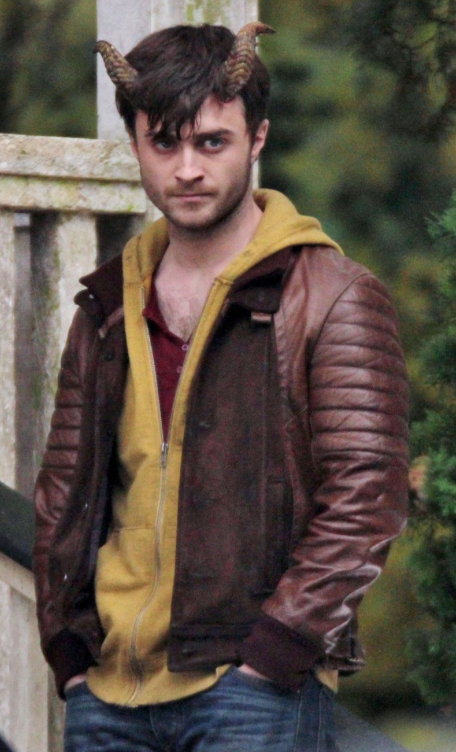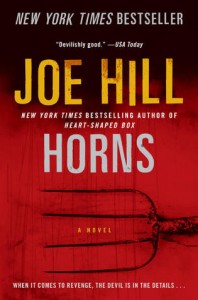 Like his father Steven King, author Joe Hill has a knack for finding the realistic details in supernatural stories. In his 2010 fantasy novel, Horns, he investigated the thin line between good and evil – the latter, he suggested, being awfully accessible to even the finest of fellows. With linguistic and emotional integrity, Hill infused new life into the imagery of these by-now hackneyed polarities. In Alexandre Aja’s new film adaptation of this book, though, something got lost in translation – namely, subtlety. What’s left is a heady indictment of the bad seeds lurking in all of us, even the most delicate of flowers. Oddly enough, “Horns” still entertains quite nicely, perhaps because it offers a well-conceived alternative to straight genre fare.
Like his father Steven King, author Joe Hill has a knack for finding the realistic details in supernatural stories. In his 2010 fantasy novel, Horns, he investigated the thin line between good and evil – the latter, he suggested, being awfully accessible to even the finest of fellows. With linguistic and emotional integrity, Hill infused new life into the imagery of these by-now hackneyed polarities. In Alexandre Aja’s new film adaptation of this book, though, something got lost in translation – namely, subtlety. What’s left is a heady indictment of the bad seeds lurking in all of us, even the most delicate of flowers. Oddly enough, “Horns” still entertains quite nicely, perhaps because it offers a well-conceived alternative to straight genre fare.
Daniel Radcliffe is Ig Perrish, a radio DJ who has become the town pariah since his girlfriend, Merrin (Juno Temple), was kidnapped, murdered, and left under their favorite treehouse. Everyone, including the cops, considers him the culprit since she was last seen dumping him during a screaming fight. Protesting crowds and TV crews even follow him wherever he goes, wielding signs that say “Burn in Hell” and shouting “What’s it feel like to get away with murder?” Ig is too distracted by his enormous well of grief to care what anyone thinks, though; Merrin was his childhood sweetheart, and only the hope of finding her killer is now keeping him going. The problem: The killer left no trail whatsoever, and Ig has no means by which to uncover one – that is, until he wakes one day with horns sprouting from his head.
Something in those pesky horns compels everyone around him to tell their most horrific truths. The confessions range from lurid – Ig’s dentist wants to bang his nurse and crush up pain pills for recreational use – to predictable – a mother of a toddler wants to kick her errant son’s ass really badly – to depressing – Ig’s own parents believe he’s guilty, and only his dad (a heartbroken David Morse) still loves him. In fact, only his childhood best friend (Max Minghella), now a public defender, is fully on his side. Once Ig recovers from the shock of these revelations (not to mention his unsightly new extrusions), he realizes he’s now equipped to solve the mystery of Merrin’s murder. A gumshoe he becomes, and the film meanders into an ultra-creepy third act that gets darker and gorier with each frame.
Once Ig recovers from the shock of these revelations (not to mention his unsightly new extrusions), he realizes he’s now equipped to solve the mystery of Merrin’s murder. A gumshoe he becomes, and the film meanders into an ultra-creepy third act that gets darker and gorier with each frame.
By now, the novelty of a Radcliffe unencumbered by Harry Potter glasses has begun to wear off. Happily, outside of the smoke and mirrors, he has emerged as a solid actor, even while soldiering a mid-Atlantic American accent. He’s more plausible in flashbacks to happier (pre-horns) times with Merrin, in which the two fawn over each other against a bucolic backdrop that looks suspiciously Biblical (not to mention “Twilight”-y; ah, the fermentation of young, supernatural love). But even as a bad boy with bony facial formations, Radcliffe snarls and sulks with the best of them. I’ve never been the biggest fan of Juno Temple – she always looks as if she’s smelling something unpleasant – but she’s aptly cast as the tiny-waisted, bosomy Merrin, the town princess with a few dark secrets of her own. This is the stuff of which modern fables are made, apparently.
I’m not sure if this film entirely benefits from Aja’s direction. Typically a helmer of such slash-and-gashers as “Piranha 3D” and “The Hills Have Eyes,” he seems out of his comfort zone when the plot veers toward romance or introspection – a shame since some of the finest elements of Hill’s book are the psychological and even moral interrogation. On the other hand, I’m also not sure who else would have been game to take on this oddbot story, and Aja’s direction really perks up once the film treads into more familiar territory for him: that is, an epic battle of good against eee-vil. Too bad the film’s initial complexity then boils down to a super-bloody whodunit, with the answer telegraphed a mile away by Keith Bunin’s lumbering script. We may still be along for the ride, though, especially since it’s photographed so beautifully by ” Blue Velvet” and “Wild At Heart” cinematographer Frederick Elmes.
No one’s going to pretend that “Horns” lives up to its source material, or even achieves any tonal consistency. It swings from tongue-in-cheek comedy to bloodbath to meta-philosophy with nary a wink. But I’m guessing that its visually appealing, genre-twisting dark-horse wit will nab ardent fans, even a cult following.
This review was originally published in Word and Film.
